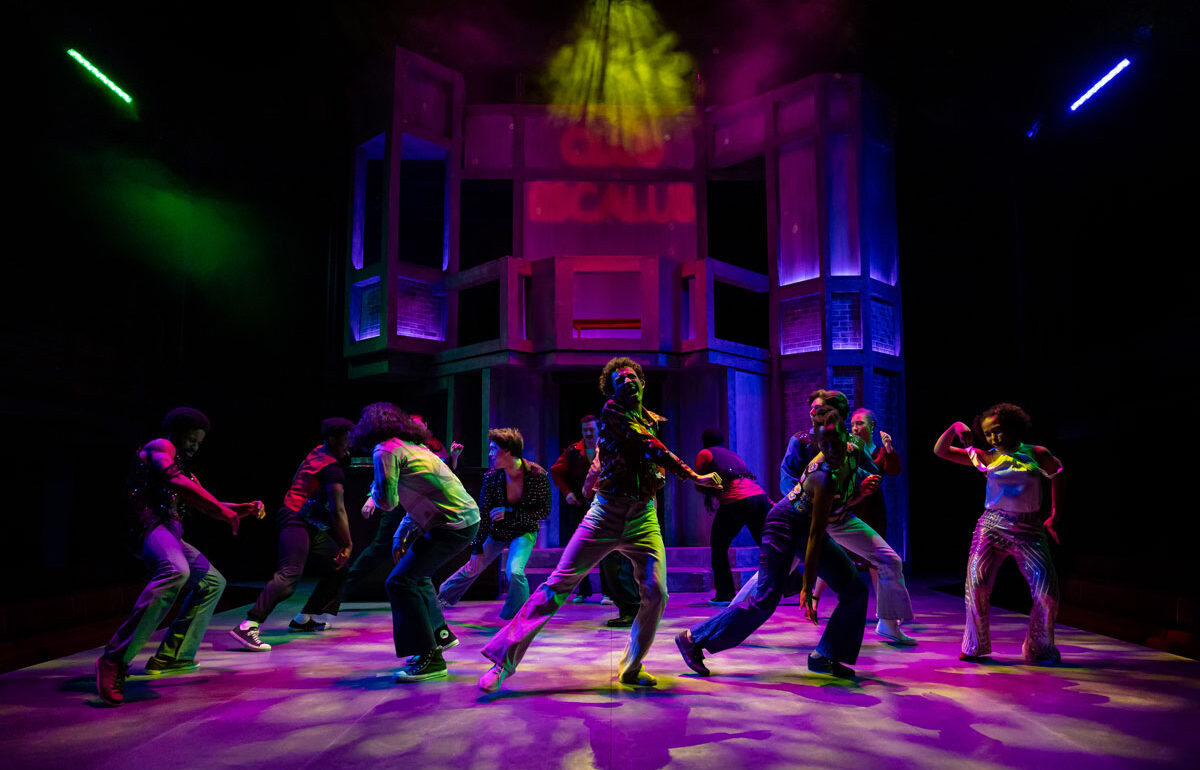If love be rough— be rough with love! Or get on down to Club Escalus for Mercutio’s Funky Boogie Woogie! Or both! All of the above. Groove to rhythm of ’75, baby— and nah, we don’t mean no 1575. We’re talkin’ 1975, ya dig? And we’re talkin’ Baltimore Baby! Closing out their 2023/2024 season on their Main Stage (and please join them for their fabulous summer fling out at the PFI in Ellicott City when R&J closes) Chesapeake Shakespeare Company is bringing you the grooviest production of Romeo & Juliet to ever hit the boards. Directed by Gerrad Alex Taylor, this funky free model puts all the right 70’s spin onto Shakespeare’s most iconic love-tragedy, and really tunes itself to the times with some local references and flavors that bring Baltimore right into the essence of the performance.
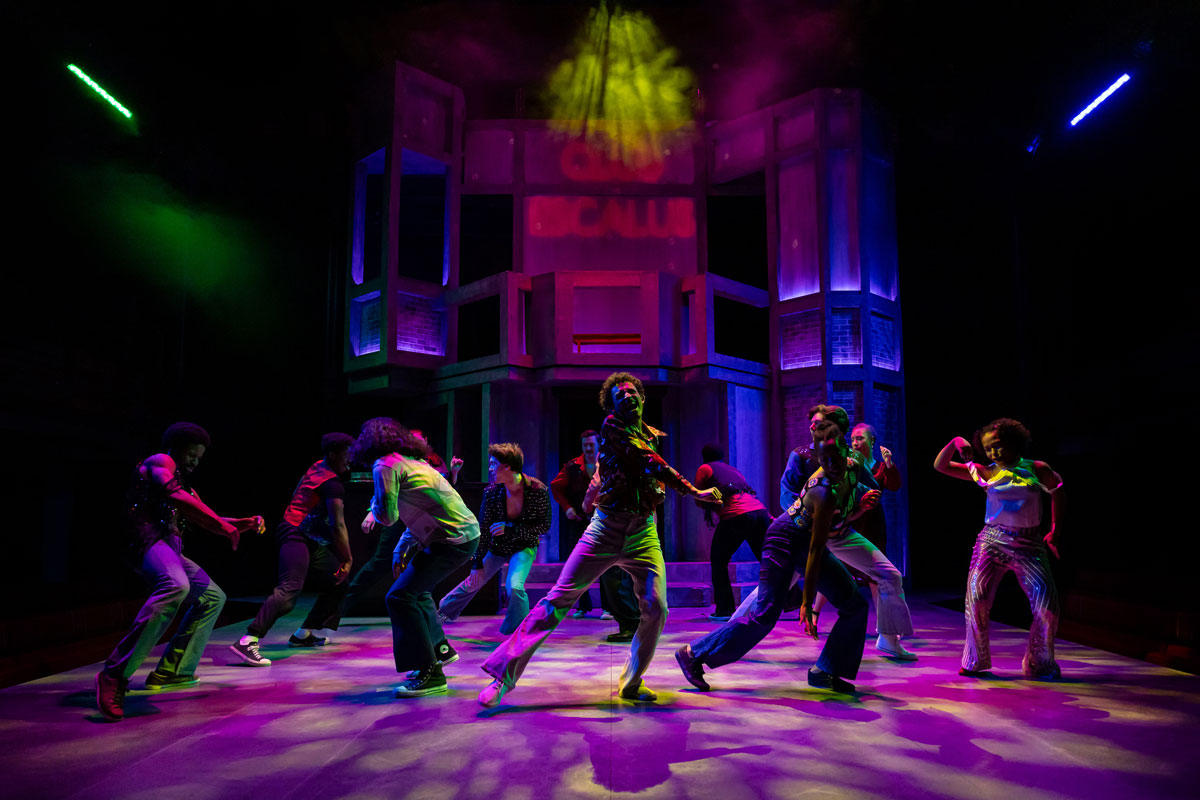
Shout out to thread-master Tylar Hinton who is keeping these cool cats in all the spiffiest of 70’s togs. Flare-legged denims, saturated colors, and loads of sequins and sparkles for the ‘ball-party’ (aptly renamed “Mercutio’s Funky Boogie Woogie.”) Hinton’s costume design work and overall sartorial selection is a well-blended balance of 70’s garb that feels like it was pulled right off of Charles Street here in Charm City. Nothing too outrageous— okay, except maybe those ‘in the club’ gems featured on all the guys as they roll up to get down at Mercutio’s Funky Boogie Woogie and that’s blazing beautifully with the disco light aesthetic that overrides that scene— and everything has a fresh feel to it. Even the stiff polished suits featured on Lord Capulet and Lord Montague have that 70’s verve about them. Hinton has done well for the overall vibe and vision of this production.
Speaking of nailing the vibe— master of illumination Minjoo Kim is lit for this production. When the mirror ball drops for the scene at Escalus’ and all the wild and rowdy disco roaming lights in full colored spectrum start swinging around you are transported. Take Kim’s lighting design and couple it with the detail-oriented projection work of Mark Williams and you’ve got another sumptuous visual feast at hand. Williams is piping ‘live footage’ of the players onto the large space at the center of the set for moments when Montague (who in this production is presented as Baltimore City Chief of Police, played admirably by John Basiulis) has to address the crowds at large over violence when it breaks out in the streets. Williams also pipes in authentic news bits and commercial ads from the 70’s along with video footage of ‘vintage 70’s Baltimore’ both pre-show and during the scene changes. Combined with the work of master DJ Kaydin Hamby (whose sound design is as on fire as all the other design components in this production), you get smooth transitions, lots of nuanced moments for the audience to really draw the Baltimore-home connection to the performance, and an overall sense of 70’s sensationalism happening.
Building up the scene and setting it to perfection, Kathryn Kawecki, working on the season-long tower that has been featured on the main stage this year, transports the audience from space to space with simple furnishings that double up and make for some really humorous moments as well. You get that leather bean bag chair in the ‘basement’ whenever we catch Mercutio and the gang watching Ali fight on the tiny TV or the spin-top which doubles as the headboard for Juliet’s bed and the soda-fountain counter. It’s elegant simplicity when it comes to Kawecki’s set design and it’s highly effective too.
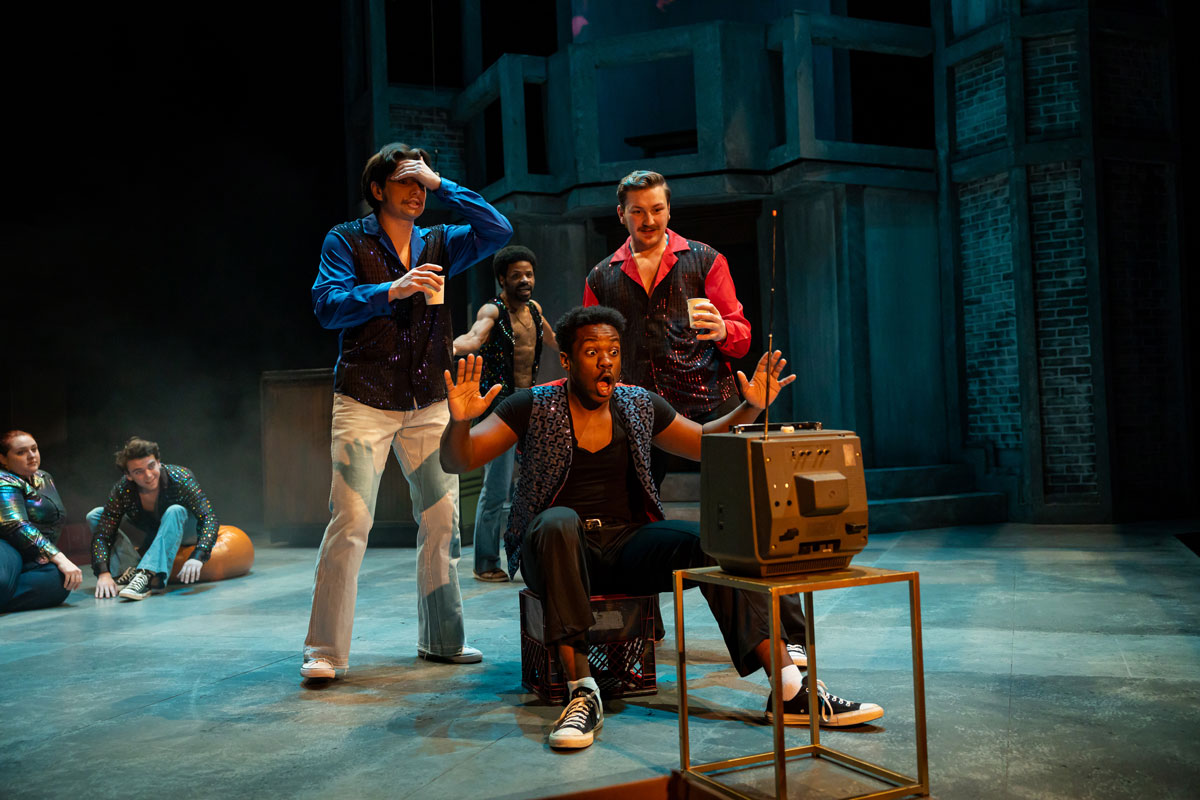
If the production has a flaw it’s the jarring shift between the first act and the second act. Director Gerrad Alex Taylor builds this flawless hybrid of textbook Romeo & Juliet infused with 70’s flavor, verbiage, and innuendo, all impeccably balanced in those scenes. Characters drop little slang bits and 70’s lingo into the text as written, you get a whole bunch of micro-moments where the characters go off-script into ad-libbed 70’s speak, and everyone feels like they’re riding the 70’s wave of wonder. It’s really extraordinary. It’s so much more than just sticking everyone in 70’s threads and putting up disco lights; Taylor has crafted something truly superb and special in that first act— including a disco-boogie get-down dance featuring the entire company (and at one point this truly beautiful moment where Lord Capulet and Romeo dance down the line together which is so symbolically striking that it stuck with me for the rest of the night!) You get a street-brawl between Tybalt and Mercutio transformed wholly into an Ali-style boxing match where switchblades are inevitably drawn; you’ve got Fr. Laurence taking a toke, albeit hilariously poorly, on a reefer stick; you’ve got all of these brilliant moments— “Good Morrow, my chump” that just perfectly infuse 1975 into Romeo & Juliet, making it this extraordinarily engaging and refreshing performance.
And then— with the exception of an impeccably placed payphone and it’s exceptionally timed ring and a reference to $20— you lose all of that in the second act. Taylor’s second act is a straight-forward, textbook presentation of Romeo & Juliet. The emotional energy is different, certainly— you go from party high and good times deeply steeped in the 70’s in the first act to a bunch of darkness in the second act, but somewhere during the intermission, the production shed its shiny 70’s veneer and loses its perfect setup. Taylor’s brilliant vision was so impressive in the first act that it was a tremendous let-down to see so little of it come to fruition in the second act. It almost feels like Taylor couldn’t find a way to take the funky, fun infusion of 70’s culture that was so spectacularly woven into Act I and thread it through into Act II without compromising the emotional gravitas that is meant to be there in the back half of the play. It was still a powerfully delivered second act but it begs out for that 70’s glaze that was so readily painted all over the first half of the performance.
That said, if the biggest complaint of the evening is that the back-half of the show doesn’t match the first half of the show in verve and vision, you’re still probably well ahead of the game. Taylor has made other phenomenal choices— like transforming Nurse to Aunty, giving the character a more personal connection to Juliet and a hell of a lot more flare and sass for interacting with the other characters. Taylor has also redistributed lines to other characters— most notably giving Capulet’s Wife more lines, and well-deserved at that— and including oft overlooked moments like a conversation between Capulet and Aunty at the ball-scene. It’s an excellent parsing of the script, an excellent reworking of the overall flow, and the performances across the board are truly stellar; we just want more of that astonishing 70’s feel to infiltrate the second act!
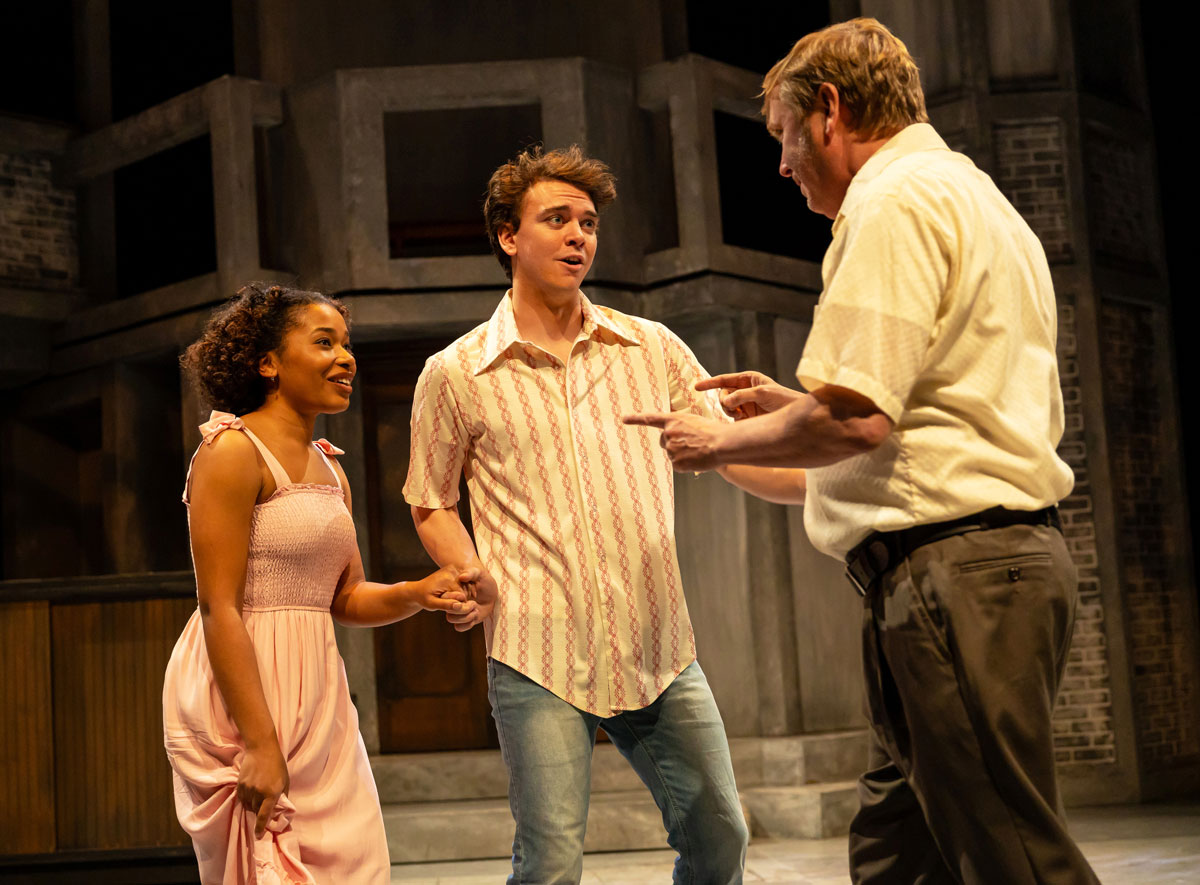
Everyone performing on the stage in this iteration of Romeo & Juliet has a profoundly solid handle on how to make their Shakespearean lines land with maximum effect (and in no small part, I’m sure, thanks to text and vocal coach Abraham Stoll.) Even the lesser-featured roles, like Peter (Kainoa Sittman), who is Aunty’s man, finds little ways to have his presence felt and lands himself some laughs when he’s running around for Aunty in the exchange of setting things up for Romeo and Juliet. Daniel Sakamoto-Wengel and Colin Maher, who play Balthasar and Abram respectively, often appear in police uniforms, and are excellently placed when it comes to executing some of Gerrad Alex Taylor’s pristine fight choreography. (You get street-level dust-ups as well as full-on boxing matches in this production, all of which are brilliantly choreographed and executed.) There is a stellar level of superb sass from Gregory (Lauren Erica Jackson) and Sampson (Charlie Junkins) as well. Whether or not that bracelet was meant to break during the “poster scene” is unclear but Jackson handled that so beautifully that it felt like it was scripted.
If you’re looking for the groovy stoner in this production, you’ll find it in Kate Forton’s Benvolio. While there’s quite a few MaryJane references floating more than obviously all throughout the performance— hey, the 70’s was the time of the ‘flower’ power and that flower was a bright-green, multi-leafed beauty— there are none quite so mellow as Forton’s Benvolio (which in a sense is ironic as you rarely see Benvolio take a hit.) Forton is a good sounding board for Romeo, though the friendship bond between the pair feels more subtle.
Gregory Burgess and Dawn Thomas Reidy hold down the fort as Capulet and Capulet’s Wife. You get the more relaxed couple featured here and there all throughout the first half of the performance, with Reidy leaning into the freedom that this interpretation of the script brings. Burgess delivers a slightly more stiffened Lord Capulet, particularly when shouting Tybalt down at the boogie-woogie, though that’s a mere candle-flicker compared to his bombastic shout-down of Juliet in the bedroom scene over marrying Paris in the second act. Reidy has a commanding stage presence about her at all times as well, so even for moments when Lady Capulet is just adrift in the background, you find your eyes gravitating toward her. And her delivery of the re-allocated concluding lines to the performance are both harrowing and stunning.
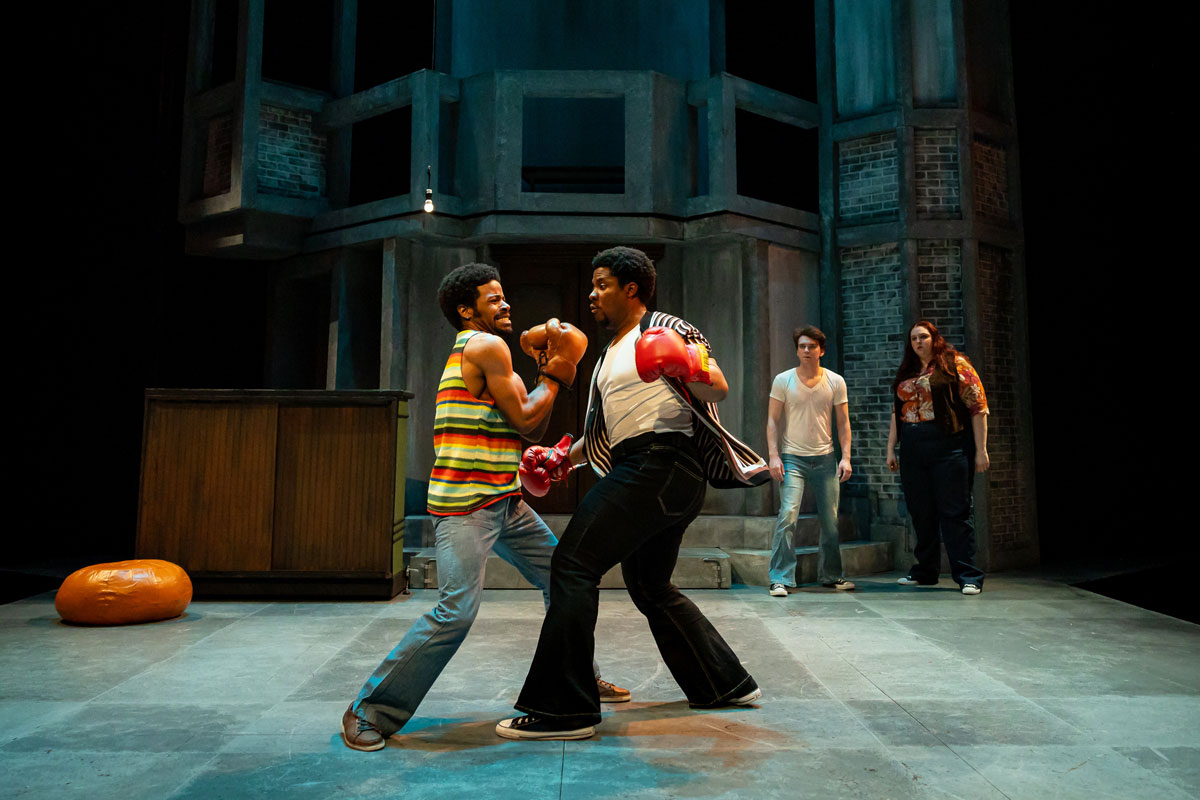
With a fresh-faced eager attitude, Isaiah Mason Harvey gives Paris an earnest romanticism that I’ve often found missing in other performances of the role; the tendency is to make him overbearing and Harvey avoids that trap entirely by making him sincere, albeit a little anxious to get things moving along. The enthusiasm with which he celebrates his ‘victory’ when Capulet agrees to let him marry Juliet, if for nothing else than to stay her melancholy over the death of her cousin, is so grandiose it’s infectious. Equally as infectious in his emotional fortitude, though in a very different vein, Lloyd Ekpe’s Tybalt is a regularly erupting font of intolerance and fury. Though less pronounced than when Capulet is on his tirades, Ekpe channels all of these negative, hateful emotions into a morass of deadly anger, which comes spiraling out during the boxing-fight-come-stage-brawl. (Again, all of these little brilliant moments— like where that brawl almost doesn’t happen because they walk away and then Mercutio calls him back or when Juliet tries to stab herself in front of Fr. Laurence and he seizes the blade but gives it back to her at the end of the scene; incredible attention to detail and foreshadowing done by Director Gerrad Alex Taylor!)
Playing it cool, like that ‘friendly neighborhood priest you can tell anything to’, Jonas Connors-Grey really brings the 70’s air into his portrayal of Father Laurence. His facial expressions are animated, his body language is engaging, and you get this sense of “that nice Catholic man who hangs out at the rectory and is friends with everybody”, exemplified all the more-so when he attempts to take a hit from the reefer stick, after telling them off about its poisons mere moments before. There’s an effortlessness to the way Connors-Grey exists in his scenes, particularly when trying to stash Romeo away in the second act, and again when coming to the bedroom of Juliet that following morning. He’s easy to watch, especially in moments when he’s just absorbing and silently responding to the situations as they unfold around him.
Really bringing the Charm City sense of everybody’s favorite Aunty to vivacious life, Tamieka Chavis is a firecracker in her own right. When she gets set upon by Mercutio and the fellas, whacking around at them with her cane is simply wild. And when she hauls off and slaps Romeo— it nearly earns her an ovation. There’s an authenticity to the way Chavis lives in this role of Aunty, friend to all, comfort to many, and certainly a boon companion to Juliet in a way that Nurse never truly could be. With exceptional comic timing for several of her wittier lines, Chavis finds a beautiful balance between hilarity and sincerity when it comes to embodying this role. And the conversation she gets to have about the passage of time with Capulet at the Boogie-Woogie is truly touching. Her interactions with Juliet truly feel familial as well. And the sassy little exchanges with Capulet’s Wife— “you get your daughter up out of bed” are a real scream.
If there’s any one actor who is wholly embodying the 1975 Baltimore vision that Gerrad Alex Taylor set down on this play, it’s Terrence Fleming in the role of Mercutio…also called ‘Cu’ by several all throughout the performance. If one could have a physical, spiritual, and emotional embodiment of this 70’s vibe and verve, you’d find it tenfold in Fleming. The way he walks, grooves and moves, the way he delivers his cadence when speaking, the way he gels with the text and the scene around him— he could be a Muhammad Ali, floating like a butterfly on Maab’s carefree wings, stinging like a bee with all of Shakespeare’s well-packed quips and insults. There’s an indefatigable enthusiasm about him, even in the character’s stiller moments, which are few and far-between. And his boxing is on point. Fleming’s performance is fueled by this sexual charisma and masculine charm, which gets loosed readily during the “Queen Maab” monologue. Fleming is the epitome of 1970’s Baltimore come to life in this role and you only wish you got more of the character and Fleming’s stellar performance as the show progresses.
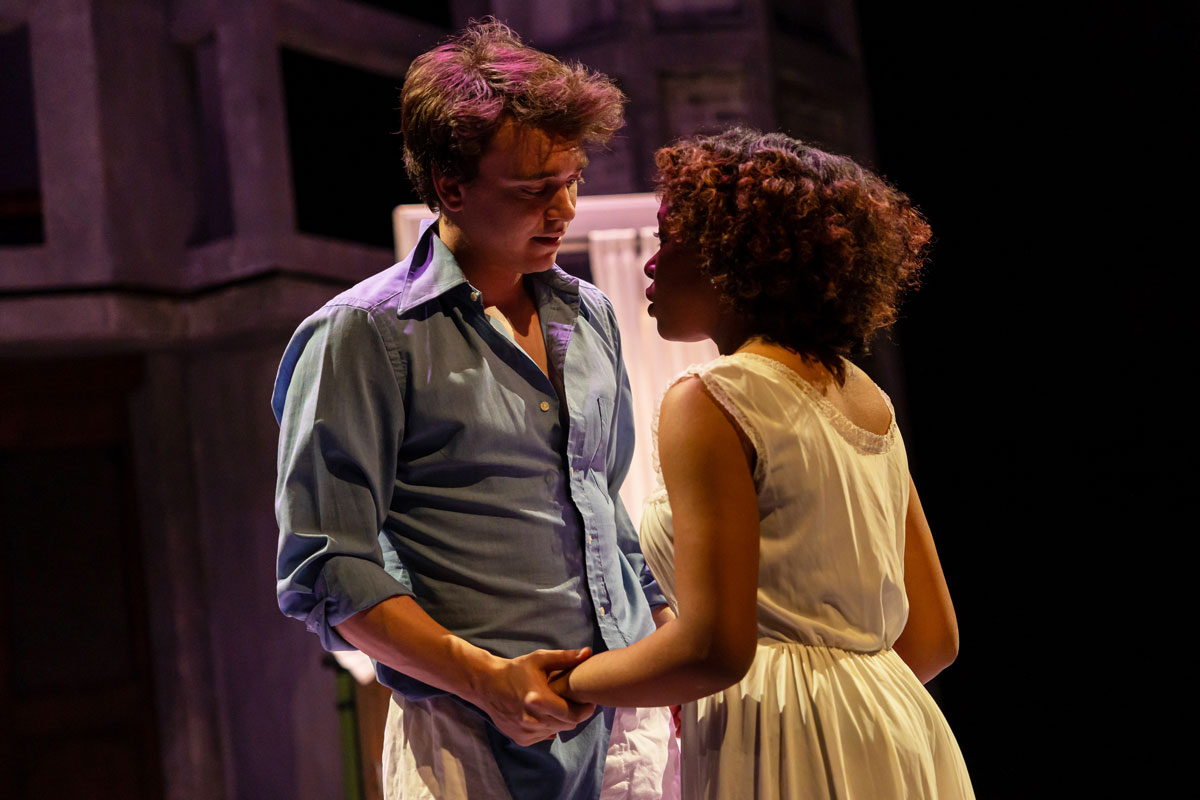
Tackling the titular roles with ingenue ease, Liam Kinna and Arielle Moore, as Romeo & Juliet respectively, have a strong ‘star-crossed-lovers’ chemistry that is truly adorable. While Moore tends to play a more textbook Juliet, shying away from a lot of that 70’s connectivity, she gives an astonishingly emotional performance overall, particularly in the second act where everything comes at a heightened price and experience for her character. As Romeo, Kinna is sending West Side Story Tony vibes (yes, yes, we all know WSS is just R&J set to music but given the setting for this particular production and the bright-eyed expressions so often featured on Kinna’s Romeo…) and this ‘tortured poet’ persona at the forefront of his portrayal. The scene shared with Fr. Laurence when he’s bemoaning his fate at the top of Act II is darkly humorous— Kinna gets to the point where he whines the word ‘banish-ed’ so many times that it starts to not sound like a word and you can see that turmoil playing across his face as he continues to cry about it. There’s this bubbly exuberance when he’s trying to climb into Juliet’s window, an adorable sense of twitterpation that just percolates through him whenever he’s with Juliet after their meet-cute at the party, and oh— ay, me! When Kinna throws down at the Boogie Woogie with a full-on body worm!? WOW! Together Liam Kinna and Arielle Moore give the titular couple real emotions and depth, which encourages the audience to care about their angsty teenage whirlwind crush.
If you’re ready to get down— if you’re ready to be rough with love— if you’re ready for a Boogie Woogie good time— Chesapeake Shakespeare has the groove and they’re calling to you— Romeo & Juliet is on their stage, stirring up some disco delights from now until the 12th of May 2024. Don’t miss it!
Running Time: 2 hours and 35 minutes with one intermission
Romeo & Juliet plays through May 12th 2024 with Chesapeake Shakespeare Company— 7 S. Calvert Street in Baltimore, MD. Tickets are available by calling the box office at 410-244-8570 or purchasing them in advance online.

